Corporate Governance in UK: Agency Theory and Framework
VerifiedAdded on 2021/02/21
|12
|2091
|407
Report
AI Summary
This report provides a detailed analysis of corporate governance in the UK, focusing on the core principles, practices, and regulatory frameworks that govern businesses. It begins with an introduction to corporate governance, defining its role in establishing rules, principles, and practices that guide companies in achieving their goals while considering stakeholder interests. The report then delves into agency theory, explaining the relationship between principals (shareholders) and agents (executives) and how conflicts of interest can arise, leading to agency costs. The working of corporate governance in the UK is explored, highlighting the Companies Act 2006, the role of the Financial Reporting Council (FRC), the Cadbury Committee, and the importance of transparency and accountability. The report also discusses different approaches to corporate governance, including rule-based and principle-based methods, and concludes by summarizing the significance of effective corporate governance in maintaining economic stability and investor confidence. The report emphasizes the importance of various UK legislations, codes, and committees in promoting ethical business practices and financial transparency.
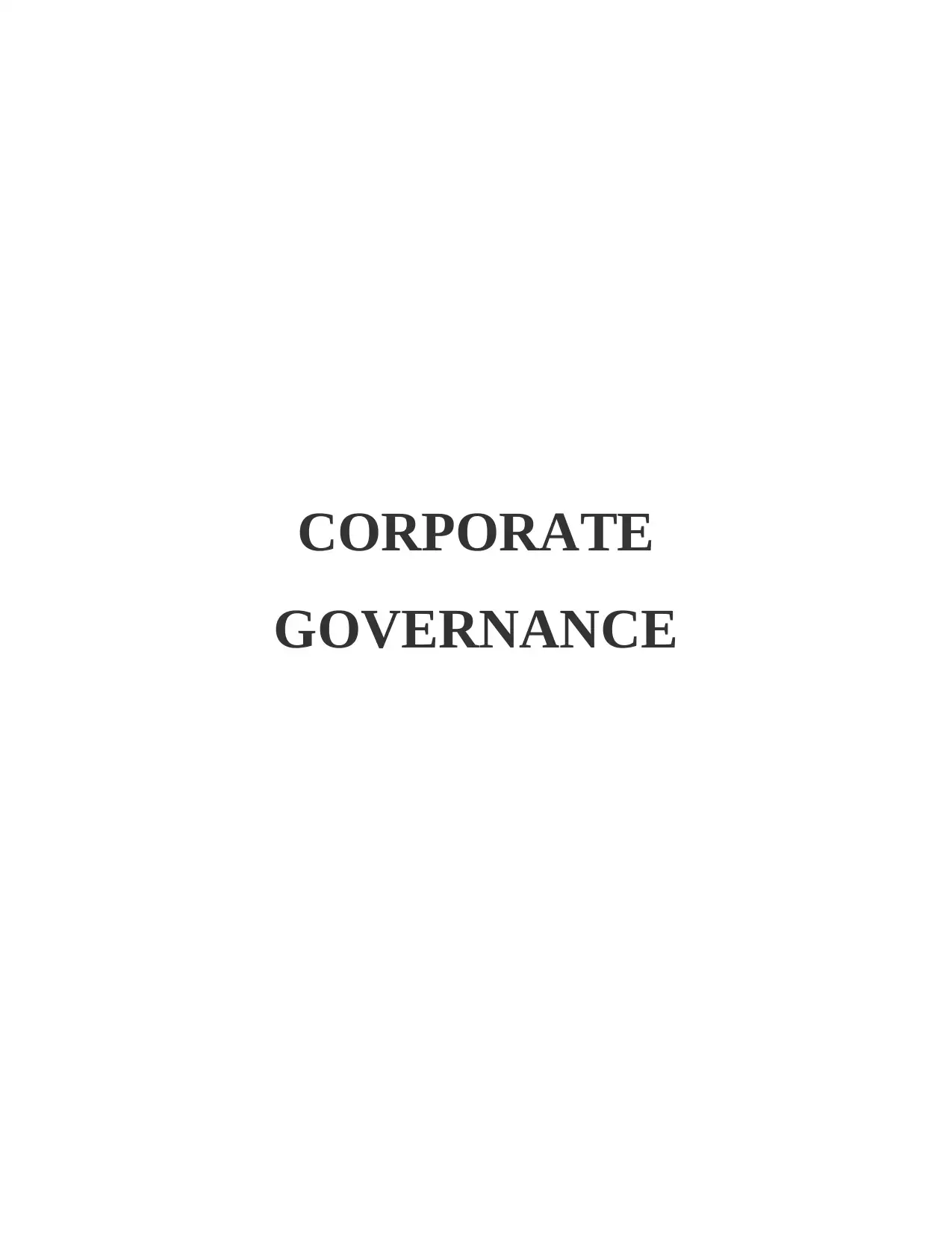
CORPORATE
GOVERNANCE
GOVERNANCE
Paraphrase This Document
Need a fresh take? Get an instant paraphrase of this document with our AI Paraphraser
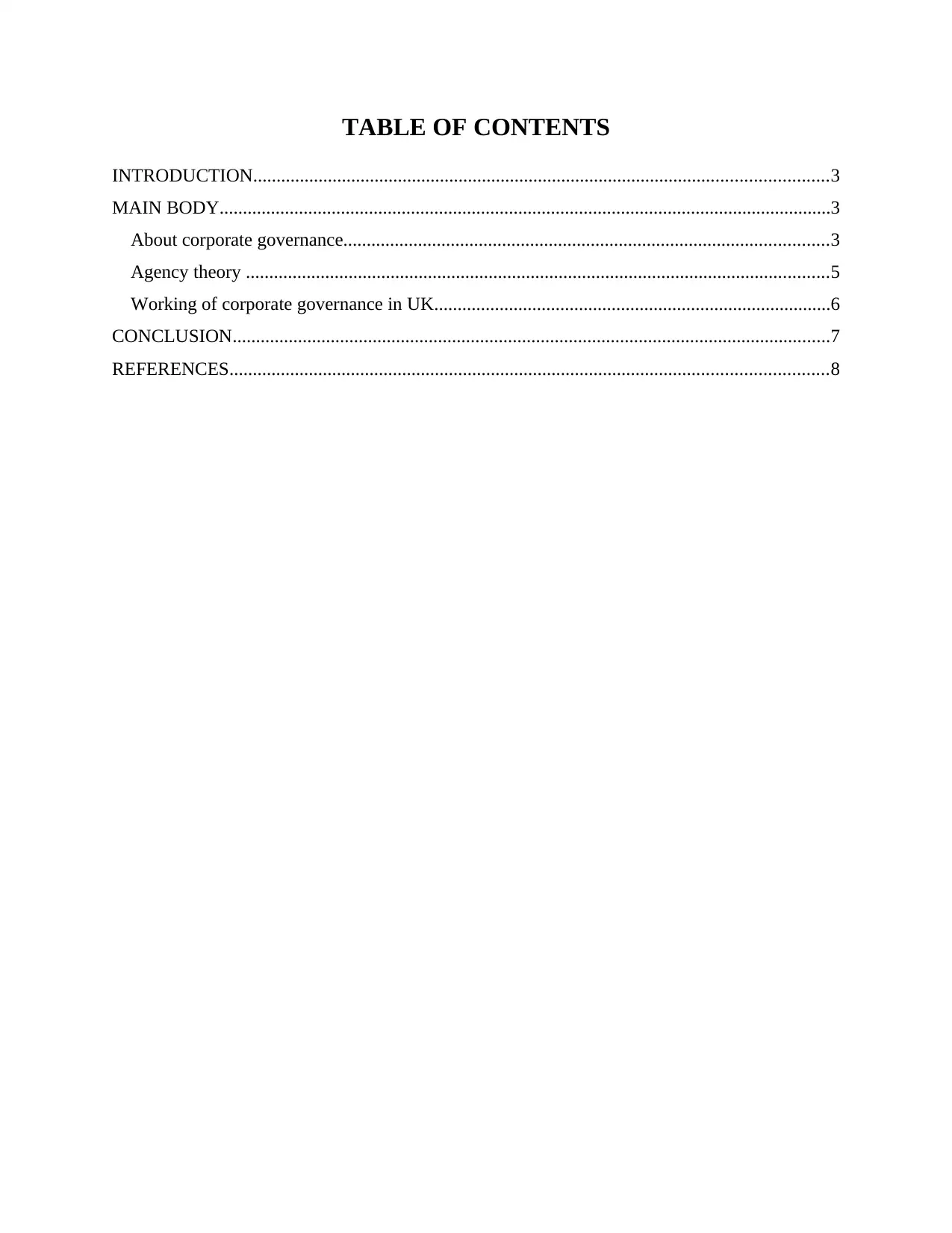
TABLE OF CONTENTS
INTRODUCTION...........................................................................................................................3
MAIN BODY...................................................................................................................................3
About corporate governance........................................................................................................3
Agency theory .............................................................................................................................5
Working of corporate governance in UK.....................................................................................6
CONCLUSION................................................................................................................................7
REFERENCES................................................................................................................................8
INTRODUCTION...........................................................................................................................3
MAIN BODY...................................................................................................................................3
About corporate governance........................................................................................................3
Agency theory .............................................................................................................................5
Working of corporate governance in UK.....................................................................................6
CONCLUSION................................................................................................................................7
REFERENCES................................................................................................................................8
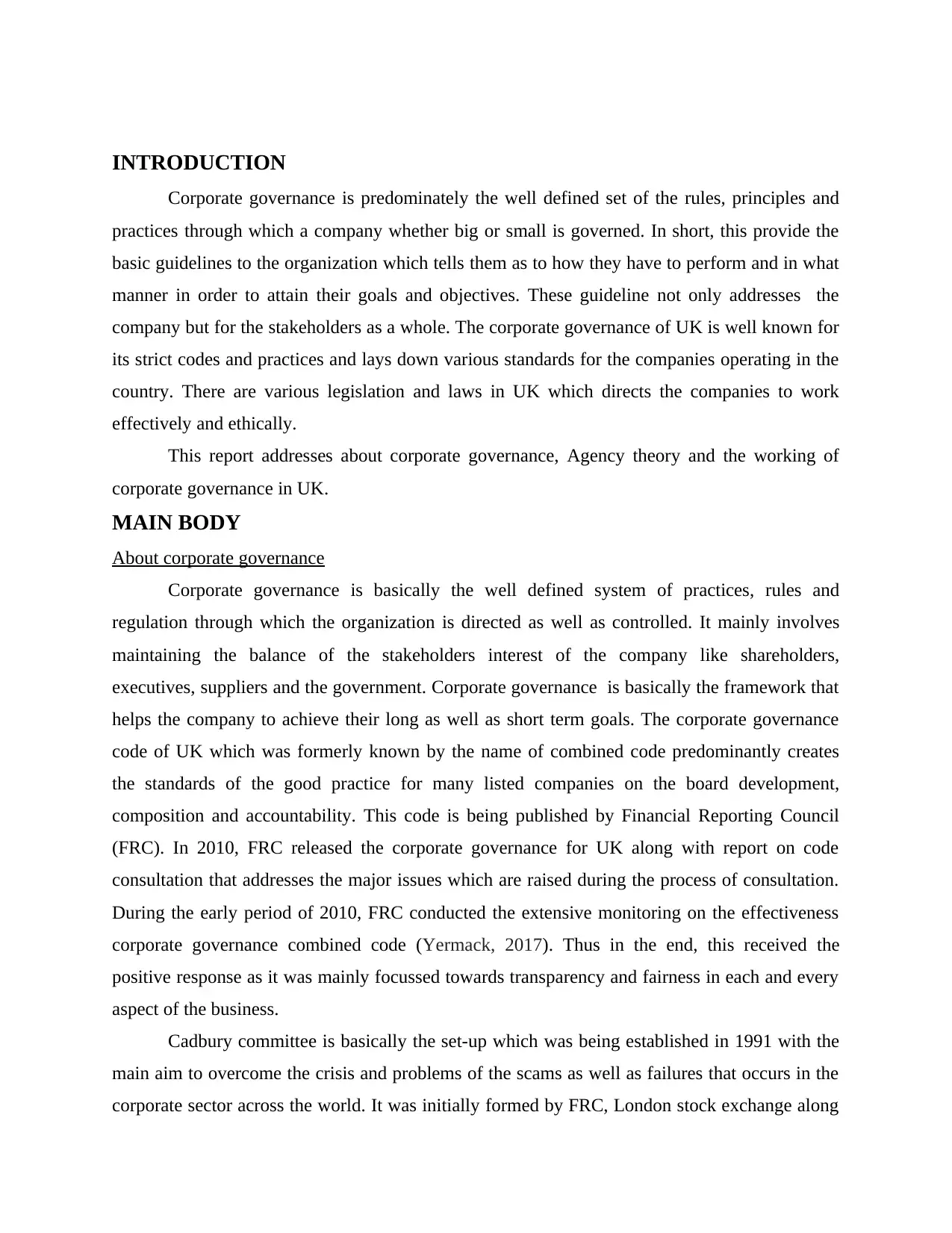
INTRODUCTION
Corporate governance is predominately the well defined set of the rules, principles and
practices through which a company whether big or small is governed. In short, this provide the
basic guidelines to the organization which tells them as to how they have to perform and in what
manner in order to attain their goals and objectives. These guideline not only addresses the
company but for the stakeholders as a whole. The corporate governance of UK is well known for
its strict codes and practices and lays down various standards for the companies operating in the
country. There are various legislation and laws in UK which directs the companies to work
effectively and ethically.
This report addresses about corporate governance, Agency theory and the working of
corporate governance in UK.
MAIN BODY
About corporate governance
Corporate governance is basically the well defined system of practices, rules and
regulation through which the organization is directed as well as controlled. It mainly involves
maintaining the balance of the stakeholders interest of the company like shareholders,
executives, suppliers and the government. Corporate governance is basically the framework that
helps the company to achieve their long as well as short term goals. The corporate governance
code of UK which was formerly known by the name of combined code predominantly creates
the standards of the good practice for many listed companies on the board development,
composition and accountability. This code is being published by Financial Reporting Council
(FRC). In 2010, FRC released the corporate governance for UK along with report on code
consultation that addresses the major issues which are raised during the process of consultation.
During the early period of 2010, FRC conducted the extensive monitoring on the effectiveness
corporate governance combined code (Yermack, 2017). Thus in the end, this received the
positive response as it was mainly focussed towards transparency and fairness in each and every
aspect of the business.
Cadbury committee is basically the set-up which was being established in 1991 with the
main aim to overcome the crisis and problems of the scams as well as failures that occurs in the
corporate sector across the world. It was initially formed by FRC, London stock exchange along
Corporate governance is predominately the well defined set of the rules, principles and
practices through which a company whether big or small is governed. In short, this provide the
basic guidelines to the organization which tells them as to how they have to perform and in what
manner in order to attain their goals and objectives. These guideline not only addresses the
company but for the stakeholders as a whole. The corporate governance of UK is well known for
its strict codes and practices and lays down various standards for the companies operating in the
country. There are various legislation and laws in UK which directs the companies to work
effectively and ethically.
This report addresses about corporate governance, Agency theory and the working of
corporate governance in UK.
MAIN BODY
About corporate governance
Corporate governance is basically the well defined system of practices, rules and
regulation through which the organization is directed as well as controlled. It mainly involves
maintaining the balance of the stakeholders interest of the company like shareholders,
executives, suppliers and the government. Corporate governance is basically the framework that
helps the company to achieve their long as well as short term goals. The corporate governance
code of UK which was formerly known by the name of combined code predominantly creates
the standards of the good practice for many listed companies on the board development,
composition and accountability. This code is being published by Financial Reporting Council
(FRC). In 2010, FRC released the corporate governance for UK along with report on code
consultation that addresses the major issues which are raised during the process of consultation.
During the early period of 2010, FRC conducted the extensive monitoring on the effectiveness
corporate governance combined code (Yermack, 2017). Thus in the end, this received the
positive response as it was mainly focussed towards transparency and fairness in each and every
aspect of the business.
Cadbury committee is basically the set-up which was being established in 1991 with the
main aim to overcome the crisis and problems of the scams as well as failures that occurs in the
corporate sector across the world. It was initially formed by FRC, London stock exchange along
⊘ This is a preview!⊘
Do you want full access?
Subscribe today to unlock all pages.

Trusted by 1+ million students worldwide
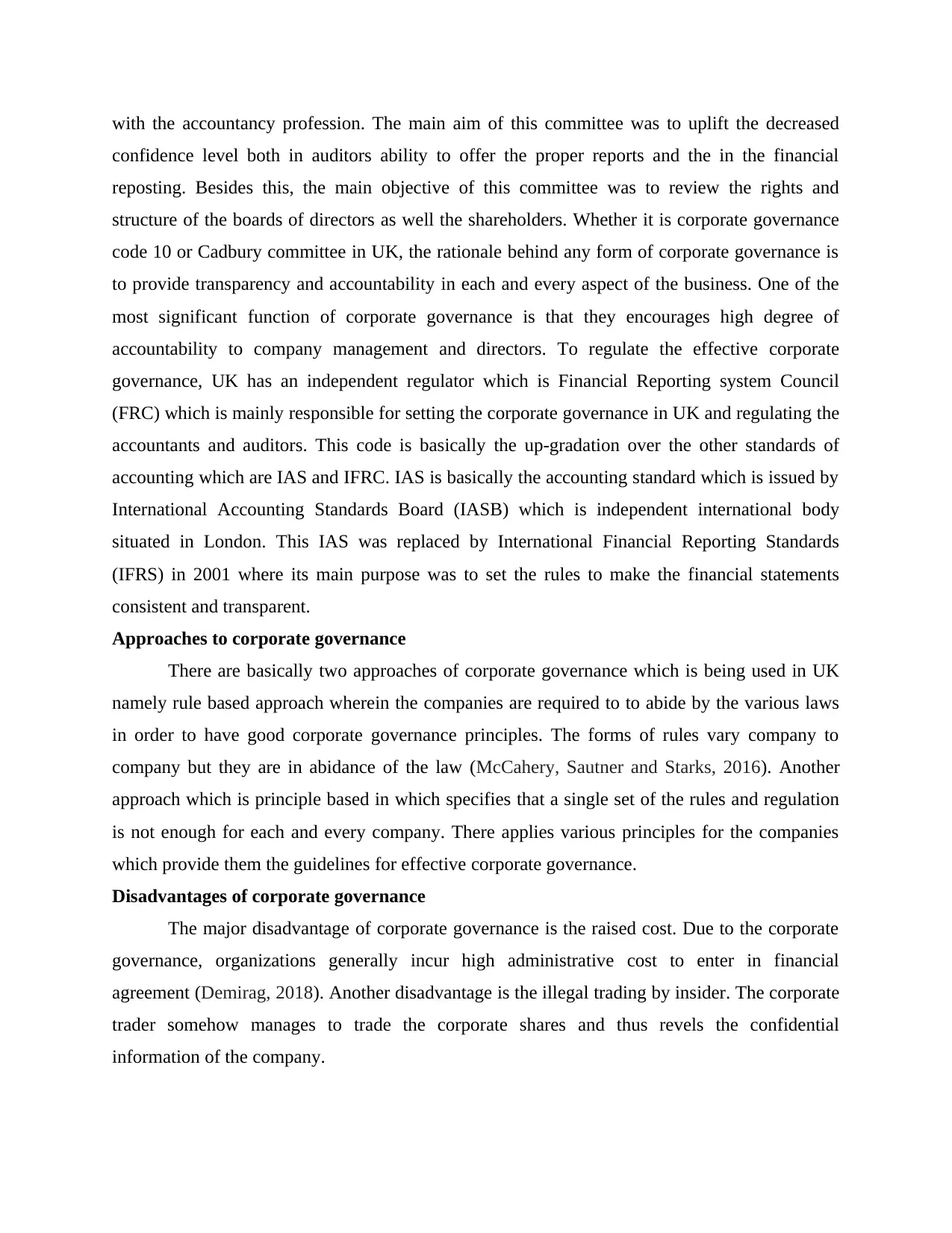
with the accountancy profession. The main aim of this committee was to uplift the decreased
confidence level both in auditors ability to offer the proper reports and the in the financial
reposting. Besides this, the main objective of this committee was to review the rights and
structure of the boards of directors as well the shareholders. Whether it is corporate governance
code 10 or Cadbury committee in UK, the rationale behind any form of corporate governance is
to provide transparency and accountability in each and every aspect of the business. One of the
most significant function of corporate governance is that they encourages high degree of
accountability to company management and directors. To regulate the effective corporate
governance, UK has an independent regulator which is Financial Reporting system Council
(FRC) which is mainly responsible for setting the corporate governance in UK and regulating the
accountants and auditors. This code is basically the up-gradation over the other standards of
accounting which are IAS and IFRC. IAS is basically the accounting standard which is issued by
International Accounting Standards Board (IASB) which is independent international body
situated in London. This IAS was replaced by International Financial Reporting Standards
(IFRS) in 2001 where its main purpose was to set the rules to make the financial statements
consistent and transparent.
Approaches to corporate governance
There are basically two approaches of corporate governance which is being used in UK
namely rule based approach wherein the companies are required to to abide by the various laws
in order to have good corporate governance principles. The forms of rules vary company to
company but they are in abidance of the law (McCahery, Sautner and Starks, 2016). Another
approach which is principle based in which specifies that a single set of the rules and regulation
is not enough for each and every company. There applies various principles for the companies
which provide them the guidelines for effective corporate governance.
Disadvantages of corporate governance
The major disadvantage of corporate governance is the raised cost. Due to the corporate
governance, organizations generally incur high administrative cost to enter in financial
agreement (Demirag, 2018). Another disadvantage is the illegal trading by insider. The corporate
trader somehow manages to trade the corporate shares and thus revels the confidential
information of the company.
confidence level both in auditors ability to offer the proper reports and the in the financial
reposting. Besides this, the main objective of this committee was to review the rights and
structure of the boards of directors as well the shareholders. Whether it is corporate governance
code 10 or Cadbury committee in UK, the rationale behind any form of corporate governance is
to provide transparency and accountability in each and every aspect of the business. One of the
most significant function of corporate governance is that they encourages high degree of
accountability to company management and directors. To regulate the effective corporate
governance, UK has an independent regulator which is Financial Reporting system Council
(FRC) which is mainly responsible for setting the corporate governance in UK and regulating the
accountants and auditors. This code is basically the up-gradation over the other standards of
accounting which are IAS and IFRC. IAS is basically the accounting standard which is issued by
International Accounting Standards Board (IASB) which is independent international body
situated in London. This IAS was replaced by International Financial Reporting Standards
(IFRS) in 2001 where its main purpose was to set the rules to make the financial statements
consistent and transparent.
Approaches to corporate governance
There are basically two approaches of corporate governance which is being used in UK
namely rule based approach wherein the companies are required to to abide by the various laws
in order to have good corporate governance principles. The forms of rules vary company to
company but they are in abidance of the law (McCahery, Sautner and Starks, 2016). Another
approach which is principle based in which specifies that a single set of the rules and regulation
is not enough for each and every company. There applies various principles for the companies
which provide them the guidelines for effective corporate governance.
Disadvantages of corporate governance
The major disadvantage of corporate governance is the raised cost. Due to the corporate
governance, organizations generally incur high administrative cost to enter in financial
agreement (Demirag, 2018). Another disadvantage is the illegal trading by insider. The corporate
trader somehow manages to trade the corporate shares and thus revels the confidential
information of the company.
Paraphrase This Document
Need a fresh take? Get an instant paraphrase of this document with our AI Paraphraser
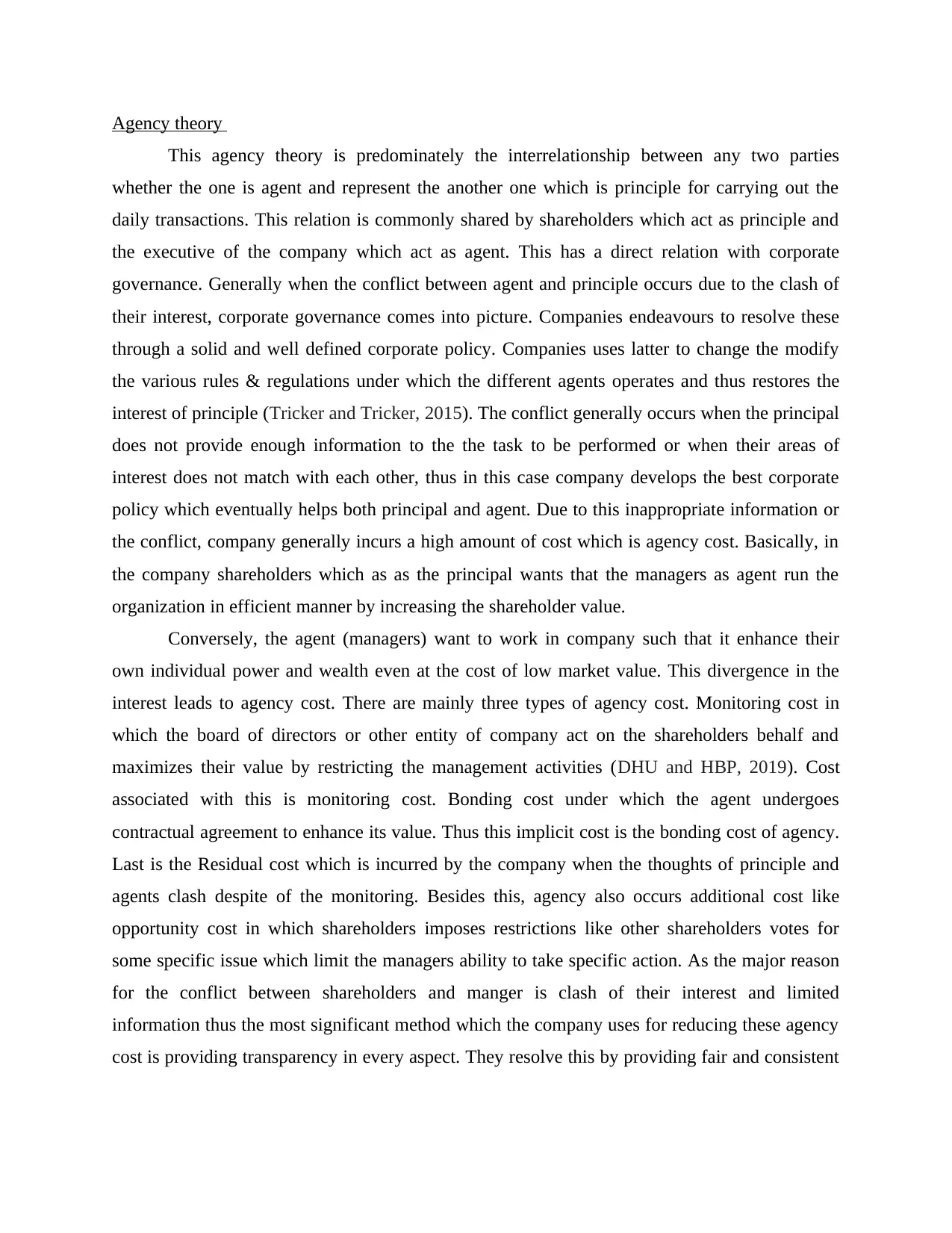
Agency theory
This agency theory is predominately the interrelationship between any two parties
whether the one is agent and represent the another one which is principle for carrying out the
daily transactions. This relation is commonly shared by shareholders which act as principle and
the executive of the company which act as agent. This has a direct relation with corporate
governance. Generally when the conflict between agent and principle occurs due to the clash of
their interest, corporate governance comes into picture. Companies endeavours to resolve these
through a solid and well defined corporate policy. Companies uses latter to change the modify
the various rules & regulations under which the different agents operates and thus restores the
interest of principle (Tricker and Tricker, 2015). The conflict generally occurs when the principal
does not provide enough information to the the task to be performed or when their areas of
interest does not match with each other, thus in this case company develops the best corporate
policy which eventually helps both principal and agent. Due to this inappropriate information or
the conflict, company generally incurs a high amount of cost which is agency cost. Basically, in
the company shareholders which as as the principal wants that the managers as agent run the
organization in efficient manner by increasing the shareholder value.
Conversely, the agent (managers) want to work in company such that it enhance their
own individual power and wealth even at the cost of low market value. This divergence in the
interest leads to agency cost. There are mainly three types of agency cost. Monitoring cost in
which the board of directors or other entity of company act on the shareholders behalf and
maximizes their value by restricting the management activities (DHU and HBP, 2019). Cost
associated with this is monitoring cost. Bonding cost under which the agent undergoes
contractual agreement to enhance its value. Thus this implicit cost is the bonding cost of agency.
Last is the Residual cost which is incurred by the company when the thoughts of principle and
agents clash despite of the monitoring. Besides this, agency also occurs additional cost like
opportunity cost in which shareholders imposes restrictions like other shareholders votes for
some specific issue which limit the managers ability to take specific action. As the major reason
for the conflict between shareholders and manger is clash of their interest and limited
information thus the most significant method which the company uses for reducing these agency
cost is providing transparency in every aspect. They resolve this by providing fair and consistent
This agency theory is predominately the interrelationship between any two parties
whether the one is agent and represent the another one which is principle for carrying out the
daily transactions. This relation is commonly shared by shareholders which act as principle and
the executive of the company which act as agent. This has a direct relation with corporate
governance. Generally when the conflict between agent and principle occurs due to the clash of
their interest, corporate governance comes into picture. Companies endeavours to resolve these
through a solid and well defined corporate policy. Companies uses latter to change the modify
the various rules & regulations under which the different agents operates and thus restores the
interest of principle (Tricker and Tricker, 2015). The conflict generally occurs when the principal
does not provide enough information to the the task to be performed or when their areas of
interest does not match with each other, thus in this case company develops the best corporate
policy which eventually helps both principal and agent. Due to this inappropriate information or
the conflict, company generally incurs a high amount of cost which is agency cost. Basically, in
the company shareholders which as as the principal wants that the managers as agent run the
organization in efficient manner by increasing the shareholder value.
Conversely, the agent (managers) want to work in company such that it enhance their
own individual power and wealth even at the cost of low market value. This divergence in the
interest leads to agency cost. There are mainly three types of agency cost. Monitoring cost in
which the board of directors or other entity of company act on the shareholders behalf and
maximizes their value by restricting the management activities (DHU and HBP, 2019). Cost
associated with this is monitoring cost. Bonding cost under which the agent undergoes
contractual agreement to enhance its value. Thus this implicit cost is the bonding cost of agency.
Last is the Residual cost which is incurred by the company when the thoughts of principle and
agents clash despite of the monitoring. Besides this, agency also occurs additional cost like
opportunity cost in which shareholders imposes restrictions like other shareholders votes for
some specific issue which limit the managers ability to take specific action. As the major reason
for the conflict between shareholders and manger is clash of their interest and limited
information thus the most significant method which the company uses for reducing these agency
cost is providing transparency in every aspect. They resolve this by providing fair and consistent
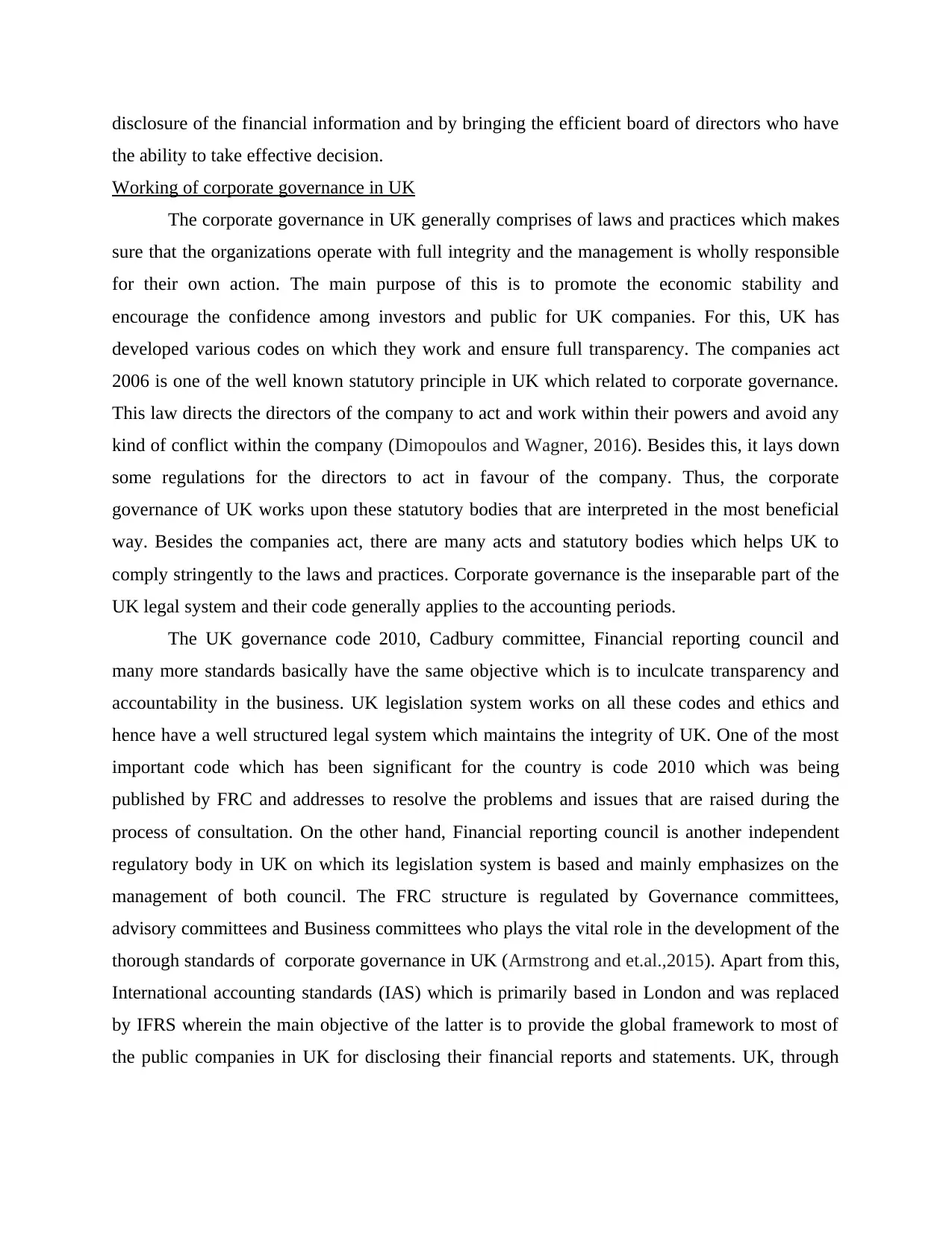
disclosure of the financial information and by bringing the efficient board of directors who have
the ability to take effective decision.
Working of corporate governance in UK
The corporate governance in UK generally comprises of laws and practices which makes
sure that the organizations operate with full integrity and the management is wholly responsible
for their own action. The main purpose of this is to promote the economic stability and
encourage the confidence among investors and public for UK companies. For this, UK has
developed various codes on which they work and ensure full transparency. The companies act
2006 is one of the well known statutory principle in UK which related to corporate governance.
This law directs the directors of the company to act and work within their powers and avoid any
kind of conflict within the company (Dimopoulos and Wagner, 2016). Besides this, it lays down
some regulations for the directors to act in favour of the company. Thus, the corporate
governance of UK works upon these statutory bodies that are interpreted in the most beneficial
way. Besides the companies act, there are many acts and statutory bodies which helps UK to
comply stringently to the laws and practices. Corporate governance is the inseparable part of the
UK legal system and their code generally applies to the accounting periods.
The UK governance code 2010, Cadbury committee, Financial reporting council and
many more standards basically have the same objective which is to inculcate transparency and
accountability in the business. UK legislation system works on all these codes and ethics and
hence have a well structured legal system which maintains the integrity of UK. One of the most
important code which has been significant for the country is code 2010 which was being
published by FRC and addresses to resolve the problems and issues that are raised during the
process of consultation. On the other hand, Financial reporting council is another independent
regulatory body in UK on which its legislation system is based and mainly emphasizes on the
management of both council. The FRC structure is regulated by Governance committees,
advisory committees and Business committees who plays the vital role in the development of the
thorough standards of corporate governance in UK (Armstrong and et.al.,2015). Apart from this,
International accounting standards (IAS) which is primarily based in London and was replaced
by IFRS wherein the main objective of the latter is to provide the global framework to most of
the public companies in UK for disclosing their financial reports and statements. UK, through
the ability to take effective decision.
Working of corporate governance in UK
The corporate governance in UK generally comprises of laws and practices which makes
sure that the organizations operate with full integrity and the management is wholly responsible
for their own action. The main purpose of this is to promote the economic stability and
encourage the confidence among investors and public for UK companies. For this, UK has
developed various codes on which they work and ensure full transparency. The companies act
2006 is one of the well known statutory principle in UK which related to corporate governance.
This law directs the directors of the company to act and work within their powers and avoid any
kind of conflict within the company (Dimopoulos and Wagner, 2016). Besides this, it lays down
some regulations for the directors to act in favour of the company. Thus, the corporate
governance of UK works upon these statutory bodies that are interpreted in the most beneficial
way. Besides the companies act, there are many acts and statutory bodies which helps UK to
comply stringently to the laws and practices. Corporate governance is the inseparable part of the
UK legal system and their code generally applies to the accounting periods.
The UK governance code 2010, Cadbury committee, Financial reporting council and
many more standards basically have the same objective which is to inculcate transparency and
accountability in the business. UK legislation system works on all these codes and ethics and
hence have a well structured legal system which maintains the integrity of UK. One of the most
important code which has been significant for the country is code 2010 which was being
published by FRC and addresses to resolve the problems and issues that are raised during the
process of consultation. On the other hand, Financial reporting council is another independent
regulatory body in UK on which its legislation system is based and mainly emphasizes on the
management of both council. The FRC structure is regulated by Governance committees,
advisory committees and Business committees who plays the vital role in the development of the
thorough standards of corporate governance in UK (Armstrong and et.al.,2015). Apart from this,
International accounting standards (IAS) which is primarily based in London and was replaced
by IFRS wherein the main objective of the latter is to provide the global framework to most of
the public companies in UK for disclosing their financial reports and statements. UK, through
⊘ This is a preview!⊘
Do you want full access?
Subscribe today to unlock all pages.

Trusted by 1+ million students worldwide
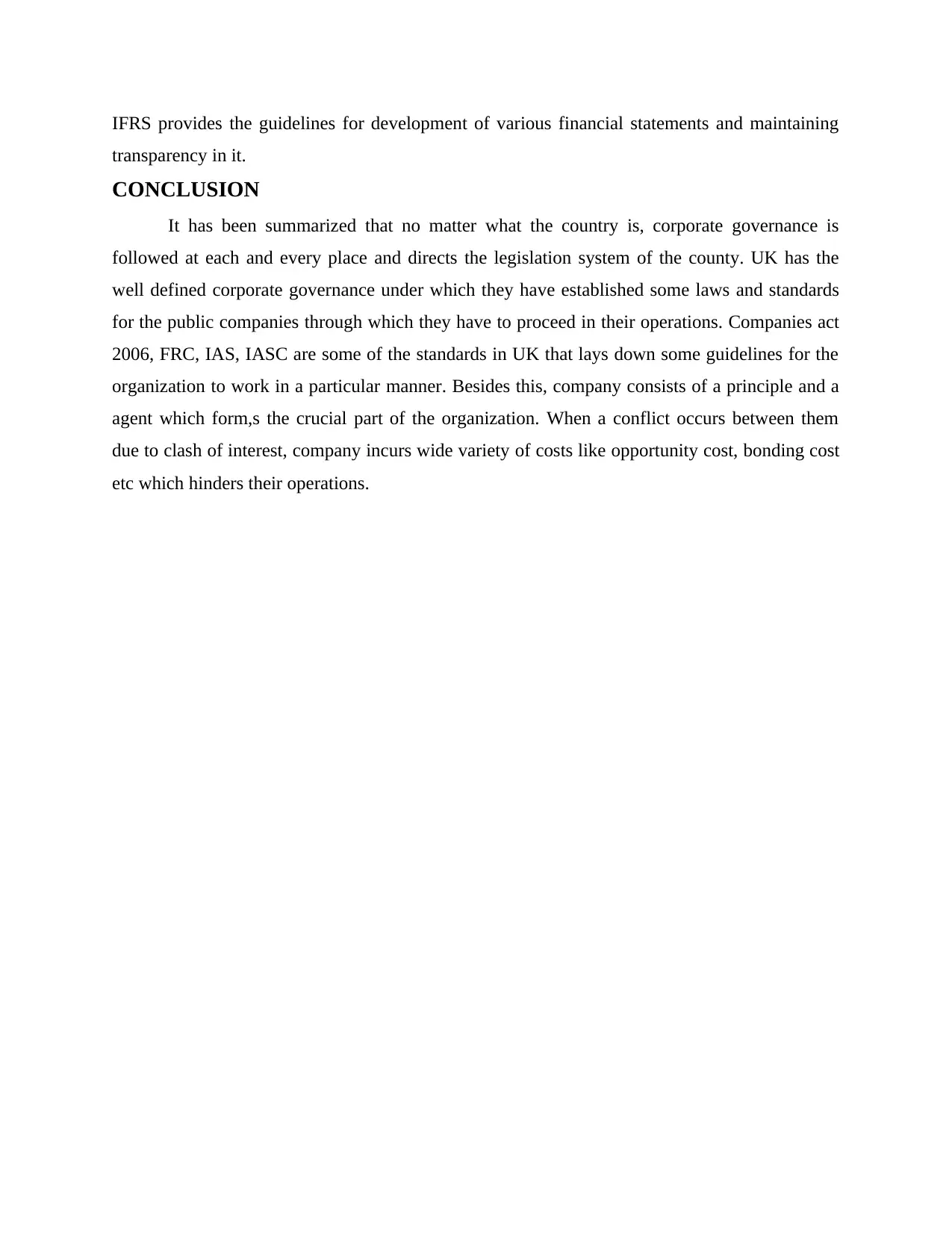
IFRS provides the guidelines for development of various financial statements and maintaining
transparency in it.
CONCLUSION
It has been summarized that no matter what the country is, corporate governance is
followed at each and every place and directs the legislation system of the county. UK has the
well defined corporate governance under which they have established some laws and standards
for the public companies through which they have to proceed in their operations. Companies act
2006, FRC, IAS, IASC are some of the standards in UK that lays down some guidelines for the
organization to work in a particular manner. Besides this, company consists of a principle and a
agent which form,s the crucial part of the organization. When a conflict occurs between them
due to clash of interest, company incurs wide variety of costs like opportunity cost, bonding cost
etc which hinders their operations.
transparency in it.
CONCLUSION
It has been summarized that no matter what the country is, corporate governance is
followed at each and every place and directs the legislation system of the county. UK has the
well defined corporate governance under which they have established some laws and standards
for the public companies through which they have to proceed in their operations. Companies act
2006, FRC, IAS, IASC are some of the standards in UK that lays down some guidelines for the
organization to work in a particular manner. Besides this, company consists of a principle and a
agent which form,s the crucial part of the organization. When a conflict occurs between them
due to clash of interest, company incurs wide variety of costs like opportunity cost, bonding cost
etc which hinders their operations.
Paraphrase This Document
Need a fresh take? Get an instant paraphrase of this document with our AI Paraphraser
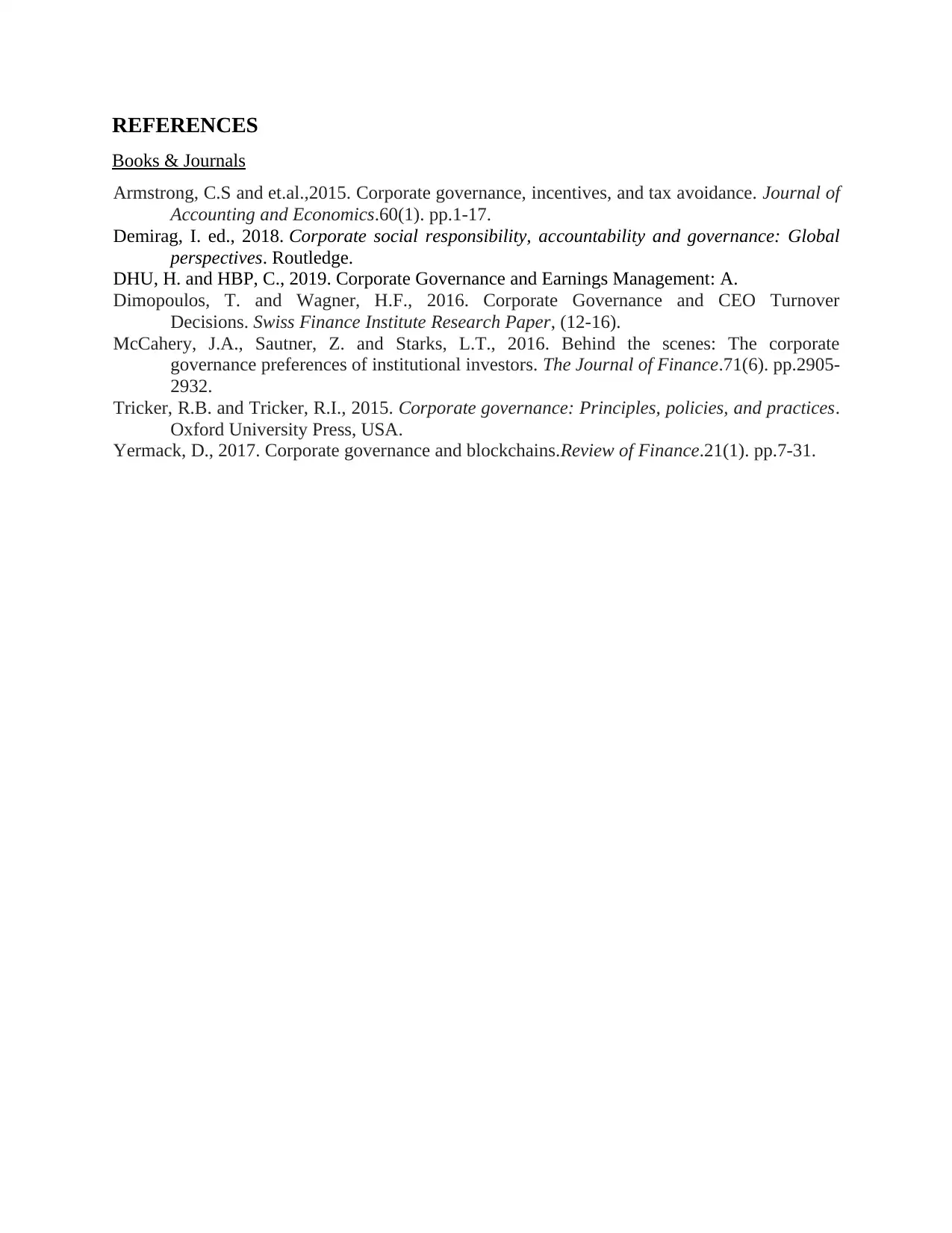
REFERENCES
Books & Journals
Armstrong, C.S and et.al.,2015. Corporate governance, incentives, and tax avoidance. Journal of
Accounting and Economics.60(1). pp.1-17.
Demirag, I. ed., 2018. Corporate social responsibility, accountability and governance: Global
perspectives. Routledge.
DHU, H. and HBP, C., 2019. Corporate Governance and Earnings Management: A.
Dimopoulos, T. and Wagner, H.F., 2016. Corporate Governance and CEO Turnover
Decisions. Swiss Finance Institute Research Paper, (12-16).
McCahery, J.A., Sautner, Z. and Starks, L.T., 2016. Behind the scenes: The corporate
governance preferences of institutional investors. The Journal of Finance.71(6). pp.2905-
2932.
Tricker, R.B. and Tricker, R.I., 2015. Corporate governance: Principles, policies, and practices.
Oxford University Press, USA.
Yermack, D., 2017. Corporate governance and blockchains.Review of Finance.21(1). pp.7-31.
Books & Journals
Armstrong, C.S and et.al.,2015. Corporate governance, incentives, and tax avoidance. Journal of
Accounting and Economics.60(1). pp.1-17.
Demirag, I. ed., 2018. Corporate social responsibility, accountability and governance: Global
perspectives. Routledge.
DHU, H. and HBP, C., 2019. Corporate Governance and Earnings Management: A.
Dimopoulos, T. and Wagner, H.F., 2016. Corporate Governance and CEO Turnover
Decisions. Swiss Finance Institute Research Paper, (12-16).
McCahery, J.A., Sautner, Z. and Starks, L.T., 2016. Behind the scenes: The corporate
governance preferences of institutional investors. The Journal of Finance.71(6). pp.2905-
2932.
Tricker, R.B. and Tricker, R.I., 2015. Corporate governance: Principles, policies, and practices.
Oxford University Press, USA.
Yermack, D., 2017. Corporate governance and blockchains.Review of Finance.21(1). pp.7-31.

⊘ This is a preview!⊘
Do you want full access?
Subscribe today to unlock all pages.

Trusted by 1+ million students worldwide

Paraphrase This Document
Need a fresh take? Get an instant paraphrase of this document with our AI Paraphraser


⊘ This is a preview!⊘
Do you want full access?
Subscribe today to unlock all pages.

Trusted by 1+ million students worldwide
1 out of 12
Related Documents
Your All-in-One AI-Powered Toolkit for Academic Success.
+13062052269
info@desklib.com
Available 24*7 on WhatsApp / Email
![[object Object]](/_next/static/media/star-bottom.7253800d.svg)
Unlock your academic potential
Copyright © 2020–2026 A2Z Services. All Rights Reserved. Developed and managed by ZUCOL.




